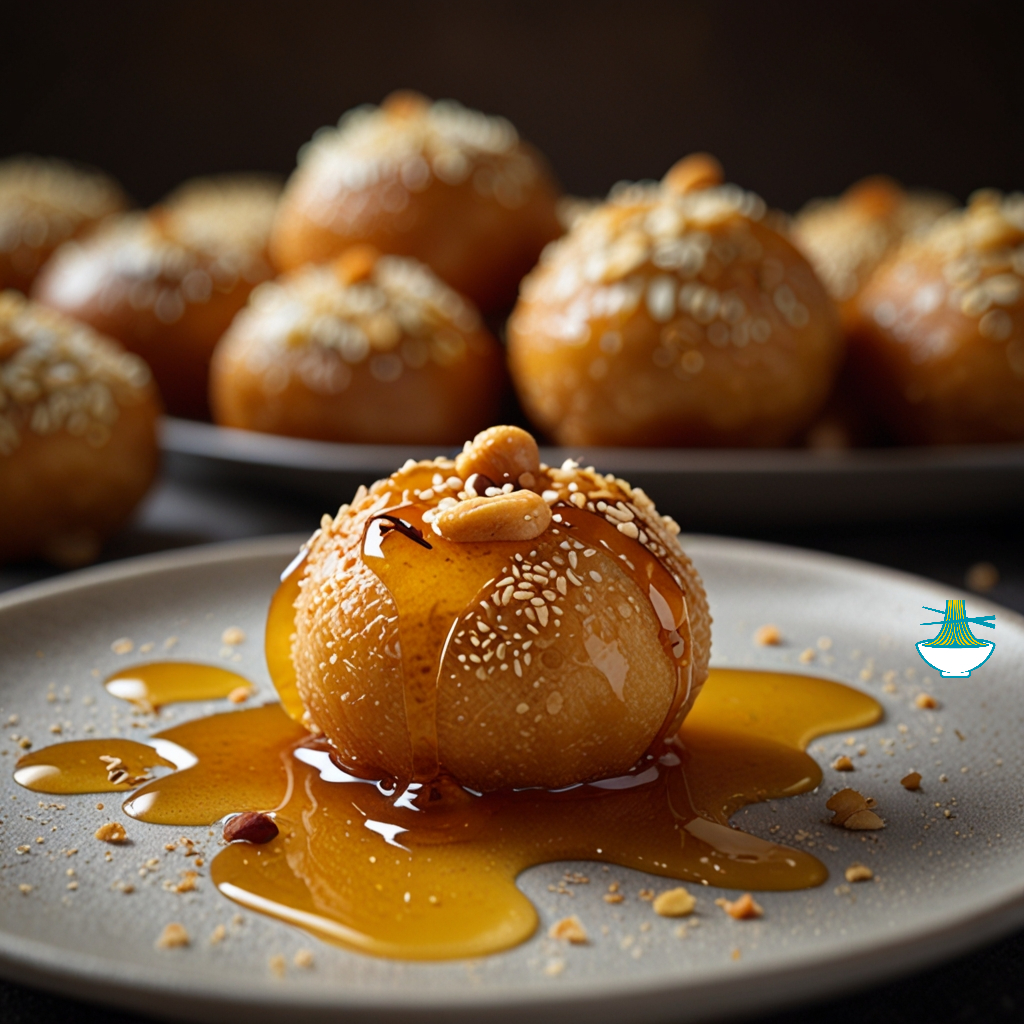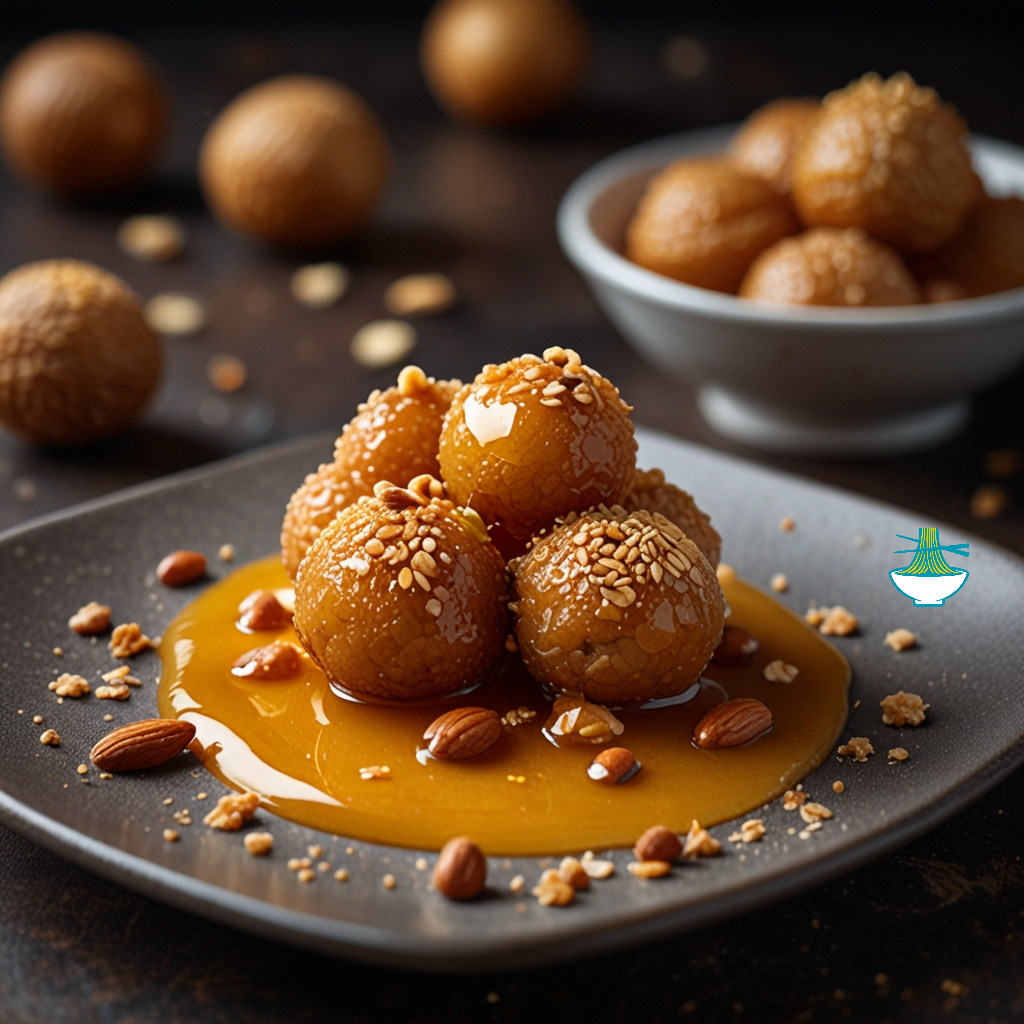Chak-Chak, a beloved dessert originating from Tatarstan in Central Asia, consists of deep-fried dough balls drenched in honey syrup, often garnished with almonds or sesame seeds. This treat holds cultural significance, traditionally served during celebrations and gatherings. Its history traces back to nomadic roots, where it provided a portable, energy-rich snack. Over time, it evolved into a cherished dessert, cherished for its delightful blend of textures and flavors. Today, Chak-Chak continues to captivate palates worldwide, offering a taste of tradition and sweetness in every bite.
Ingredients:
- 2 cups all-purpose flour
- 2 large eggs
- 1/4 cup honey
- 1/4 cup granulated sugar
- 1/4 cup water
- Vegetable oil for frying
- Optional: chopped almonds or sesame seeds for garnish

Method:
1. In a mixing bowl, combine the flour and eggs to form a dough. Knead until smooth.
2. Roll out the dough into a thin sheet and cut into small pieces or roll into small balls.
3. In a deep pan, heat vegetable oil over medium heat.
4. Fry the dough pieces/balls in batches until golden brown and crispy. Remove with a slotted spoon and drain on paper towels.
5. In a separate saucepan, combine honey, sugar, and water. Heat over low heat until the sugar dissolves and the mixture thickens slightly to form a syrup.
6. Pour the syrup over the fried dough, coating evenly.
7. Optionally, sprinkle chopped almonds or sesame seeds on top for added flavor and texture.
8. Allow the Chak-Chak to cool and set before serving. Enjoy!
Nutrition Value:
1. All-Purpose Flour (2 cups):
- Calories: Approximately 800 kcal
- Carbohydrates: Approximately 168 grams
- Protein: Approximately 20 grams
- Fat: Approximately 2 grams
- Sodium: Negligible
- Cholesterol: Negligible
- Vitamins: Contains small amounts of B vitamins, especially niacin (B3) and riboflavin (B2)
- Minerals: Contains small amounts of iron and magnesium
- Nutritional Benefit: Provides energy from carbohydrates and some protein. Contains some B vitamins and minerals, particularly iron, which is important for oxygen transport in the body.
2. Large Eggs (2):
- Calories: Approximately 140 kcal
- Carbohydrates: Approximately 1 gram
- Protein: Approximately 12 grams
- Fat: Approximately 10 grams
- Sodium: Approximately 140 mg
- Cholesterol: Approximately 370 mg
- Vitamins: Rich in vitamin B12, vitamin D, vitamin A, riboflavin (B2), and folate (B9)
- Minerals: Contains small amounts of calcium, iron, potassium, and phosphorus
- Nutritional Benefit: Excellent source of high-quality protein and essential vitamins and minerals, including B vitamins and vitamin D. Provides healthy fats.
3. Honey (1/4 cup):
- Calories: Approximately 240 kcal
- Carbohydrates: Approximately 64 grams
- Protein: Approximately 0 grams
- Fat: Approximately 0 grams
- Sodium: Negligible
- Cholesterol: Negligible
- Vitamins: Contains small amounts of vitamin C, riboflavin (B2), and niacin (B3)
- Minerals: Contains small amounts of calcium, iron, potassium, and phosphorus
- Nutritional Benefit: Natural sweetener with antioxidant properties. Contains small amounts of vitamins and minerals.
4. Granulated Sugar (1/4 cup):
- Calories: Approximately 200 kcal
- Carbohydrates: Approximately 50 grams
- Protein: Approximately 0 grams
- Fat: Approximately 0 grams
- Sodium: Negligible
- Cholesterol: Negligible
- Vitamins: None
- Minerals: None
- Nutritional Benefit: Provides quick energy but lacks significant nutritional value. Should be consumed in moderation.
5. Water (1/4 cup):
- Calories: 0 kcal
- Carbohydrates: 0 grams
- Protein: 0 grams
- Fat: 0 grams
- Sodium: 0 mg
- Cholesterol: 0 mg
- Vitamins: None
- Minerals: None
- Nutritional Benefit: Essential for hydration and various bodily functions.
6. Vegetable Oil for Frying:
- Calories: Approximately 120 kcal per tablespoon (varies depending on type of oil)
- Carbohydrates: 0 grams
- Protein: 0 grams
- Fat: Approximately 14 grams per tablespoon (varies depending on type of oil)
- Sodium: Negligible
- Cholesterol: 0 mg (varies depending on type of oil)
- Vitamins: Varies depending on the type of oil; some may contain vitamin E
- Minerals: Varies depending on the type of oil
- Nutritional Benefit: Provides fat for frying. Choose healthier options like olive oil or canola oil for better nutrient profiles.
7. Optional: Chopped Almonds or Sesame Seeds for Garnish:
- Calories: Approximately 160 kcal per ounce of almonds; Approximately 50 kcal per tablespoon of sesame seeds
- Carbohydrates: Approximately 6 grams per ounce of almonds; Approximately 2 grams per tablespoon of sesame seeds
- Protein: Approximately 6 grams per ounce of almonds; Approximately 2 grams per tablespoon of sesame seeds
- Fat: Approximately 14 grams per ounce of almonds; Approximately 4 grams per tablespoon of sesame seeds
- Sodium: Negligible
- Cholesterol: 0 mg
- Vitamins: Almonds are rich in vitamin E and contain small amounts of B vitamins. Sesame seeds are a good source of B vitamins, especially niacin (B3), and vitamin E.
- Minerals: Almonds are high in magnesium, phosphorus, and calcium. Sesame seeds are rich in copper, manganese, magnesium, and calcium.
- Nutritional Benefit: Provides additional flavor, texture, and nutritional value, including healthy fats, protein, and various vitamins and minerals.


Comments